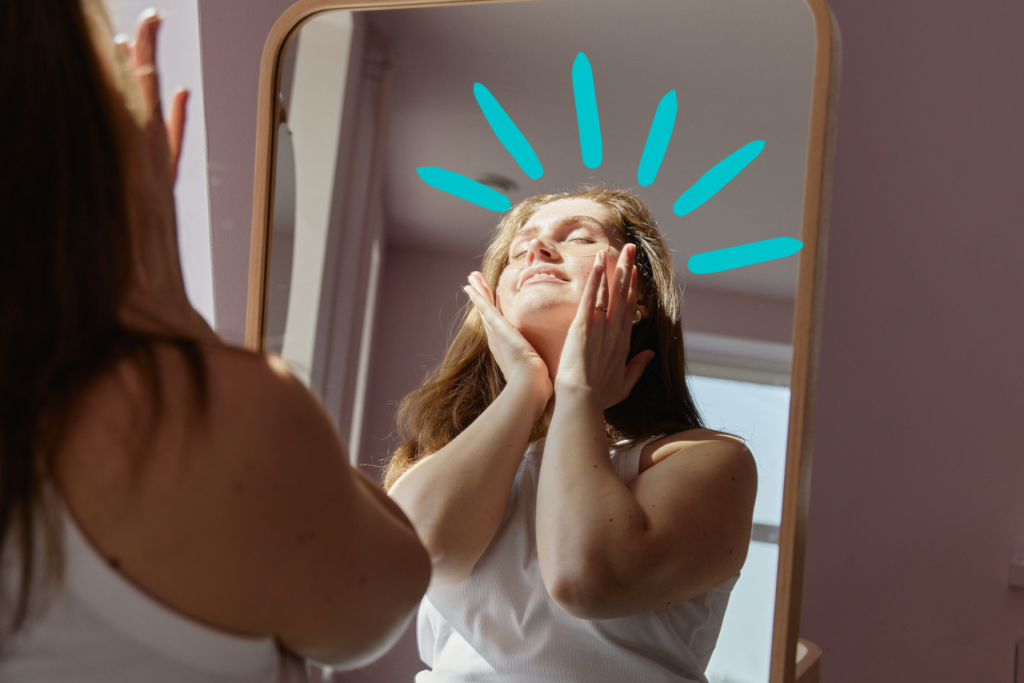Your skin is your body’s largest organ, covering over 2 metres and weighing in at around 3.5 kg. But did you ever think about how your skin was also your body’s most honest organ?
Hear us out… Able to convey too many late nights, reveal just how stressed you’ve been, and announce to the world the quality of your sleep and diet, your complexion can say so much about you without uttering a word.
After the two years we’ve all had, it’s only natural to look in the mirror and notice a few more wrinkles or stress spots.
That doesn’t mean you should resign yourself to the sudden onset of more visible ageing, however. Instead, here are 8 interesting, innovative ways to improve your complexion.
A Clear Complexion Starts With Your Diet…
Put simply, eating the right foods can do wonders for your skin, but there are a few vitamins that are particularly beneficial for your complexion.
Vitamin A, especially, can promote better skin health from the inside out, via supplements, skincare products and, of course, your diet. While topical formulas may target acne directly, and cod liver oil supplements can boost your Vitamin A intake, too, it’s still most wholesome and healthy to seek the majority of this super nutrient from your diet; eggs, milk and cereal, in particular, are blessed with loads of the stuff, as are carrots, sweet potatoes, and spinach.
Vitamin D, most commonly derived from your skin absorbing sunlight, can also do wonders for your complexion. Though it’s not found in vast abundance in your diet alone, there are fortified foods, such as breakfast cereals, that contain it. Vitamin D also occurs naturally in oily fish, particularly salmon and tuna.
Vitamin C is another dietary element that can help your skin look its most youthful and radiant. As Healthline explains, ‘’Vitamin C is critical for the synthesis of hyaluronic acid. Hyaluronic acid has been touted for speeding up recovery time and relieving painful joints. Without adequate levels of vitamin C, your body will not gain the full benefit of foods containing hyaluronic acid.’’
Vitamin C can be found in high quantities in citrus fruits, peppers, broccoli, brussel sprouts, blueberries and strawberries.

…And Knowing What To Avoid
On the flip side, you’ll want to avoid the processed ones, too. Operating under a rather ironic title, AGEs (Advanced Glycation End Products) are formed when proteins or fats combine with sugar in the bloodstream. The formation of these AGEs are one of the key factors which contribute to accelerated ageing, and so foods which are high in them should be avoided.
Generally speaking, processed and fried foods are highest in these AGEs, with butter, cream cheese, mayonnaise, and some cooking oils particularly bad culprits. If you’re keen to prevent premature ageing, it’s first important to cut back on food high in AGEs. At least it’s easy to remember, hey?
Potentially Stimulate Collagen Production
Long story short, collagen is made up of essential amino acids, and is the glue that holds you together, as it binds tissues and cells, maintaining their integrity. It is the main structural and most abundant protein in your body, responsible for keeping everything in place. Whenever you consider how strong your joints or teeth are or how exceptional your skin elasticity is (what, you don’t do that?) you have collagen to thank for that.
Unfortunately, as we grow older, our bodies get worse at producing collagen, which leads to (among other things) hair loss, wrinkles, or joint pain. Additionally, a more modern version of consumption (toxins, pollution, stimulants, processed foods) also contributes to the detriment of collagen production. Finding ways to stimulate production of the good stuff, then, whether via food diet or technology, can help with your complexion as you age.
- Via Diet
In terms of diet, you can include more collagen rich foods in your mealtimes. These include dairy, fish, eggs, lean meat, stock (sometimes referred to as ‘bone broth’), potatoes, broccoli, cereals, citrus fruits, nuts, shellfish, strawberries, and blackcurrants.
- Via Treatments
There are also technological innovations emerging aimed at stimulating collagen production. For instance, the ingredients of Osmosis Skincare products may potentially activate collagen by supporting skin nutrition and health.
Another such innovation is Ellanse treatment, a non-surgical procedure that uses a collagen stimulator with the aim of improving your skin’s elasticity and firmness and giving you a more youthful appearance.
LED light or red light therapy is another popular skincare treatment that uses different wavelengths of light to treat various skin concerns. It can improve the appearance of fine lines, wrinkles, sun damage, and even acne. You can learn more about the pros and cons of this treatment at TherapeuticBeams.com.
If you’re looking for treatment in England, it’s recommended that you check the Care Quality Commission (CQC) database for clinics registered to perform this service. The efficacy of such treatments isn’t necessarily guaranteed, and is certainly no substitute for a balanced diet, plenty of quality sleep, and a dedicated exercise regime.
Deploy A Humidifier
From taking care of your complexion from the inside to caring for it from the outside… Using a humidifier can do wonders for your skin, particularly if you live in a dry climate or are regularly exposed to an air-conditioned office.
A humidifier adds moisture to the air, which can help your skin absorb more of the stuff, in turn potentially reducing the appearance of fine lines and wrinkles. It can also help your skin look plumper and more hydrated.

Focus On Both The Quantity & Quality Of Your Sleep
Sleep is important for your overall health, and that includes your skin. When you don’t sleep enough, your body produces the stress hormone cortisol. It can destroy that previously praised collagen, as well as elastin, the protein that gives your skin its youthful appearance. So make sure to get at least seven hours of sleep every night to keep your skin looking its best.
Follow these tips to get quality sleep every night:
- Don’t use your mobile before bed: The blue light from the screen can disrupt your circadian rhythm, making it harder to fall asleep.
- Make sure your bedroom is dark: Use blackout curtains or an eye mask to block any light.
- Invest in a comfortable mattress and pillow: Your bed should be a haven for rest, not a source of discomfort.
And for further sleep-friendly tips, check out these smart ways to make sleep more restful.
Consider Using A Homemade, All Natural Exfoliant
Chemical exfoliants have been growing in popularity in recent years, but the thought does seem a little off-putting at first. When you hear ‘chemical’, does your mind also automatically picture the green and blue fizzing liquids that you’d mess around with back in your chemistry class? Imagine putting that on your face.
In fact, these chemical exfoliants essentially sit on your skin and gently remove the dead skin cells without you having to scrub at your skin. Look out for exfoliants with AHA’s and BHA’s (alpha and beta hydroxy acids) that are the most popular and effective forms of chemical exfoliants. Just be careful not to use exfoliators – start off slowly and build up your skin’s tolerance to exfoliate up to 2-3 times a week.
If you’d like a true-natural exfoliant, rest assured; you can make one at home. Ingredients you’ll have around the house that are popular to use include caster sugar, ground coffee, ground cinnamon, finely ground salt, and baking soda. Check out our tips on natural remedies for glowing skin for more advice on the subject.
Apply Sunscreen With A Religious Dedication
One of the most effective ways to protect your skin is sunscreen. It can help prevent sun damage, leading to wrinkles, fine lines, and brown spots. It can also help prevent skin cancer.
Relaxing under the summer sun might be your idea of heaven, but too much exposure to harmful UV rays can damage your skin. Sometimes, it pays to remember that while a sun-kissed tan is fleeting, skin damage is permanent.
If you want to avoid the premature onset of deep-set wrinkles, leathery skin and sagging, it’s essential you avoid soaking up the sun for long, undisturbed stretches when outdoors. What’s more, you should always wear a minimum SPF 30 sun protection to shield your skin from harmful rays. This even applies to time spent outdoors in winter, which can still be damaging to your skin, even if it doesn’t feel like it.
Purified Water
Some also choose to use purified water in their beauty regimes, which may lead to a brighter, perkier complexion. If you’re wondering whether you, too, should use purified water in your beauty regime, then we’ve explored that question here. Do check it out.
The Bottom Line
Taking care of your skin is important to maintain a youthful appearance. Follow the tips above to keep your skin looking its best. And if you’re ever in doubt, consult a dermatologist for advice.





